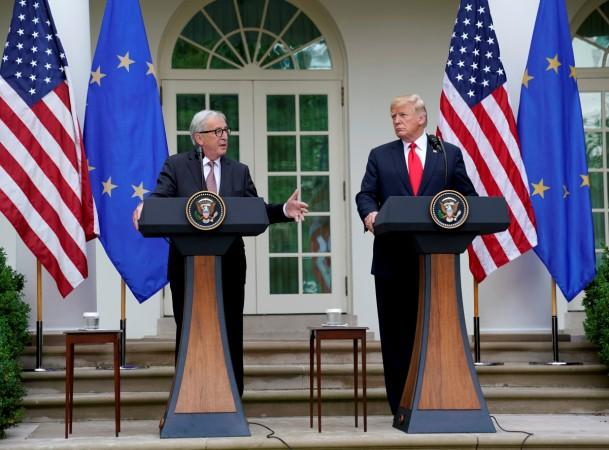
US President Donald Trump has announced he has reached an agreement with the European Union (EU) to move forward together toward a "zero tariff" situation, thus avoiding a trade war, after meeting the president of the European Commission, Jean-Claude Juncker.
Trump on Wednesday said he had reached an agreement to work together toward a policy of "zero" tariffs and trade barriers, adding "we are starting the negotiation right now, but we know where it is going" and proclaiming "a new phase" in US-EU trade relations, Efe news reported.
Meanwhile, both Washington and Brussels will "hold off on other tariffs" while the talks are underway, Juncker said.
In a joint appearance before the press with Juncker, Trump said that the European Union will begin importing soybeans from the US Midwest, as well as liquefied natural gas to "diversity" its energy sources, in addition to reducing some industrial tariffs.
The EC chief, meanwhile, hailed the trade agreement, which includes reducing tariffs by both parties and easing the bilateral frictions that had arisen in recent months. Juncker said that he had gone into his Oval Office meeting with Trump with both parties intending to reach an agreement.
He also said that the pact establishes the "resolution" of the US tariffs on European steel and aluminium that had sparked a trade brouhaha between Brussels and Washington, although neither Trump nor Juncker specified whether these would be immediately annulled.
Minutes later, at a conference at the Center for Strategic and International Studies, Juncker said that the agreement emphasised the "special" nature of the alliance between the US and the EU going on to stress that trade between the two parties comprises half of all global commerce.
Juncker's visit to Washington aroused great expectations after the exchange of accusations and the imposition of tariffs by Trump on European steel and aluminium, to which Brussels had responded with identical measures on assorted US products, including motorcycles and jeans.
Trump has insisted in recent months on the need for the EU to agree to his demands to facilitate US access to the European market and has threatened to impose tariffs of up to 20 per cent on imports of European automobiles if the bloc did not make concessions to Washington.








